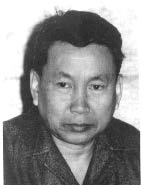Part 4: Darwinism, The Source of Communist Savagery
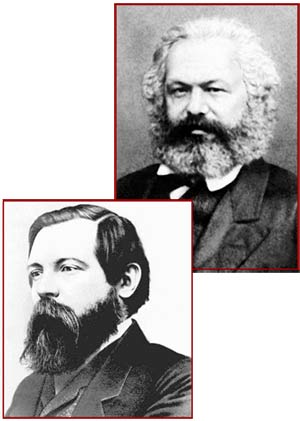 |
| The founders of Communism, Karl Marx and Friedrich Engels. |
The ideology which brought the greatest harm to mankind in the violence and savagery-filled century we have just left behind, and the most widespread in the world, was without doubt Communism. Communism, which reached its historical peak with the two German philosophers Karl Marx and Friedrich Engels in the 19th century, spilt so much blood in the world that it left even the Nazis and the imperialists behind. It led to the deaths of innocent people and spread violence, fear, and hopelessness among mankind. Even today when someone speaks of The Iron Curtain countries and Russia, images rise up of communities ruled by darkness, fog, and hopelessness, lifeless streets, trouble and fear. No matter how much Communism is thought of as having been torn down in 1991, the debris it left behind it still exists. No matter how "liberalised" one part of the "unrepentant" Communists and Marxists may be, materialist philosophy, the dark side of Communism and Marxism and which turned people away from religion and morality, still continues to influence these people.
This ideology which spread terror to every corner of the world actually represented an idea which goes back to ancient times. Dialectics was a belief that all development in the universe arose as the result of conflict. Based on this belief Marx and Engels set about analysing the history of the world. Marx claimed that the history of man was one of conflict, that the current conflict was one between workers and capitalists, and that the workers would soon rise up and build a Communist revolution.
The most striking feature of the two founders of Communism was that, like all materialists, they nurtured a great hatred of religion. Marx and Engels were both confirmed atheists and saw the doing away with religious beliefs as essential from the point of view of Communism.
But Marx and Engels lacked one important thing: in order to attract a wider public they needed to give their ideology a scientific appearance. And the dangerous alliance which gave rise to the pain, chaos, mass murders, turning of brother against brother, and separatism of the 20th century emerged at this point. Darwin proposed his theory of evolution in his book The Origin of Species. And how interesting it is that the basic claims he put forward were just the explanations Marx and Engels were looking for. Darwin claimed that living things emerged as a result of the "struggle for survival" or "dialectical conflict." Furthermore he denied creation and rejected religious beliefs. For Marx and Engels this was an opportunity not to be missed.
The Collapse of The Marxist View of History |
| Karl Marx, the founder of Communism, adapted Darwin's ideas, which deeply influenced him, to the dialectic process of history. According to Marx, society went through different phases in history, and the factor which determined these phases was the change in the means of production and production relations. According to this view, the economy determined everything else. History went through evolutionary stages: Primitive society, slave society, feudal society, capitalist society, and the last stage, Communist society. Yet history itself showed that Marx's proposed evolutionary period possessed no validity. At no time in history has any society been seen which has gone through Marx's proposed evolutionary stages. On the contrary, it is possible to see systems which Marx identified as coming before or after each other at the same time in the same society. While one part of a country is experiencing systems similar to the feudal system, capitalist rules may apply in another region. For which reason there is absolutely no proof that the passage from one system to another follows the evolutionary pattern claimed by Marx and the theory of evolution. On the other hand, none of Marx's prophecies regarding the future came true. It was realised that Marx's theories were not applicable within 10 years of Marx's death. Marx claimed that one after the other the most developed capitalist nations would undergo Communist revolutions, whereas no such period happened. Lenin, one of Marx's greatest followers, tried to explain why these revolutions had not taken place, and then put forward other prophecies that Communist revolutions would be experienced in Third World countries. Yet all of Lenin's claims were proven untrue by history. In our time the number of countries run under Communism can be counted on the fingers of one hand. Furthermore, Marxism used force in the regions where it came to power, and it came to power not by popular movements, as it claimed, but by dictatorial pressure. In short, recent history has completely disproved Marxist philosophy's predicted period of historical evolution. Theories such as "the dialectic of history" and "historical evolution" in the many volumes written by materialist ideologues such as Marx and Engels, are just products of fantasy. |
Marx and Engels' Admiration of Darwin
Darwinism was of such great importance to Communism that only months after Darwin's book was published, Engels wrote to Marx, "Darwin, whom I am just now reading, is splendid."78
Marx wrote back to Engels on December 19, 1860, saying, "This is the book which contains the basis in natural history for our view."79
In a letter Marx wrote to Lassalle, another socialist friend of his, on January 16, 1861, he said: "Darwin's book is very important and serves me as a basis in natural science for the class struggle in history."80
thus revealing the importance of the theory of evolution for Communism.
Marx revealed his sympathy for Darwin by dedicating his most important work, Das Kapital, to him. Darwin's copy of Marx's first volume was inscribed by Marx, describing himself as a "sincere admirer" of the English naturalist.81
Engels too admitted his admiration for Darwin elsewhere:
Nature is the test of dialectics, and it must be said... that in the last resort nature works dialectically and not metaphysically... In this connection, Darwin must be named before all others.82
Engels praised Darwin and Marx as being the same, "Just as Darwin discovered the law of evolution in organic nature, so Marx discovered the law of evolution in human history" he said.83
In another of his works,Engels stressed the importance of Darwin's having developed a theory opposed to religion:
He (Darwin) dealt the metaphysical conception of nature the heaviest blow by his proof that the organic world of today — plants, animals, and consequently man too — is the product of a process of evolution going on through millions of years.84
As well as this, Engels at once showed how he had accepted Darwin's theory by writing an article titled "The Part Played by Labour in the Transition from Ape to Man."
The American researcher Conway Zirckle explains why the founders of Communism immediately accepted Darwin's theory"
Marx and Engels accepted evolution almost immediately after Darwin published The Origin of Species. Evolution, of course, was just what the founders of communism needed to explain how mankind could have come into being without the intervention of any supernatural force, and consequently it could be used to bolster the foundations of their materialistic philosophy. In addition, Darwin's interpretation of evolution–that evolution had come about through the operation of natural selection–gave them an alternative hypothesis to the prevailing teleological explanation of the observed fact that all forms of life are adapted to their conditions.85
Tom Bethell, of Harper's Magazine, explains the fundamental link between Marx and Darwin in the following manner:
Marx admired Darwin's book not for economic reasons but for the more fundamental one that Darwin's universe was purely materialistic, and the explication of it no longer involved any reference to unobservable, nonmaterial causes outside or 'beyond' it. In that important respect, Darwin and Marx were truly comrades.86
Today the link between Darwinism and Marxism is an obvious truth accepted by everyone. Biographies of Marx always make this plain. For example, a biography of Karl Marx describes the link in this way:
"Darwinism presented a whole string of truth supporting Marxism and proving and developing the truth of it. The spread of Darwinist evolutionary ideas created a fertile ground for Marxist ideas as a whole to be taken on board by the working class… Marx, Engels, and Lenin attached great value to the ideas of Darwin and pointed to their scientific importance, and in this way the spread of these ideas was accelerated."87
As we have seen, Marx and Engels were delighted to believe that Darwin's concept of evolution formed a scientific support for their own atheist world view. But this delight proved to be premature. The theory of evolution saw wide acceptance because it was proposed in a primitive 19th century scientific environment and was full of errors lacking any sort of scientific proof. Science, which developed in the second half of the 20th century, revealed the invalidity of the theory of evolution. This meant the collapse of Communist and materialist thinking as much as it did of Darwinism. (For further details see The Evolution Deceit by Harun Yahya). But because scientists with materialist views knew that the collapse of Darwinism also meant the collapse of their own ideologies they tried all possible methods to conceal Darwinism's collapse from people.
The Admiration of the Followers of Marx and Engels for Darwin
Marx and Engels' followers, who brought about the deaths of millions of people and were the reason for hundreds of millions of others living in pain, fear, and violence, accepted the theory of evolution with great joy and interest.
John N. Moore speaks of the links between evolution and the Soviet leaders who implemented Marx and Engels' ideas in Russia:
The thinking of the leaders of the USSR is rooted deeply in an evolutionary outlook.88
 |
It was Lenin who made Marx's project of Communist revolution come true. Lenin, the leader of the Communist Bolshevik movement in Russia, aimed to bring down the Tsarist regime in Russia by force of arms. The chaos after World War I gave the Bolsheviks the opportunity they had been seeking. With Lenin at their head, the Communists seized power by the use of arms in October 1917. After the revolution Russia was the scene of a bloody three-year civil war between Communists and supporters of the tsar.
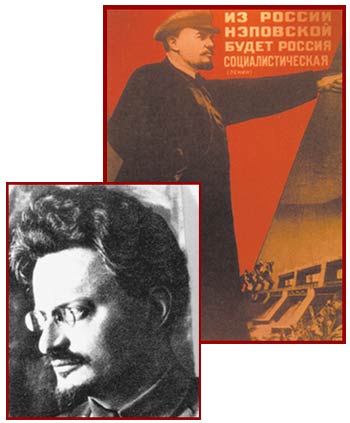 |
| Lenin and Trotsky |
Like the other Communist leaders, Lenin often stressed that Darwin's theory was the fundamental basis of dialectical materialist philosophy.
One of his statements reveals his view of Darwinism:
Darwin put an end to the belief that the animal and vegetable species bear no relation to one another, except by chance, and that they were created by God, and hence immutable.89
Trotsky, counted the most important architect of the Bolshevik revolution after Lenin, again attached great importance to Darwinism. He declared his admiration for Darwin in the following way,
Darwin's discovery is the highest triumph of the dialectic in the whole field of organic matter.90
Following Lenin's death in 1924, Stalin, widely regarded as the bloodiest dictator in the history of the world, passed to the leadership of the Communist Party. Throughout his 30 years in power, Stalin would try to prove just what a ruthless system Communism was.
Stalin's first important move was to take over the fields of the peasants who made up 80 percent of the population of Russia in the name of the state. In the name of this policy of collectivisation which was intended to do away with private property, all the Russian villagers' crops were collected by armed officials. As a result there was a terrible famine – millions of women, children, and the elderly who could find nothing to eat ended their lives writhing in hunger. The death toll in the Caucasus alone was 1 million.
Stalin sent hundreds of thousands of people who tried to resist this policy to Siberia's dreadful labour camps. These camps, where the prisoners were worked to death, became the grave of most of these people. On the other hand tens of thousands of people were executed by Stalin's secret police. Millions of people were forced to migrate to the furthest corners of Russia, including the Crimean and Turkestan Turks.
By these bloody policies Stalin killed some 20 million people. Historians have revealed that this savagery gave him enormous personal pleasure. It gave him great pleasure to sit at his desk in the Kremlin and examine the lists of those who had died in the concentration camps or who had been executed.
 |
| Stalin, one of the bloodiest names in history, the cause of the killing of tens of millions of people, death from starvation and poverty, and of millions of people being left without homes and jobs. |
Apart from his personal psychological state, the main influence which lead him to become such a ruthless killer was the materialist philosophy he believed in. In Stalin's own words, the fundamental basis of this philosophy was Darwin's theory of evolution. He explained the importance he attached to Darwin's ideas:
There are three things that we do to disabuse the minds of our seminary students. We had to teach them the age of the earth, the geologic origin, and Darwin's teachings.91
While Stalin was still alive a close childhood friend of his recounted how Stalin had become an atheist in the book Landmarks in the Life of Stalin:
At a very early age, while still a pupil in the ecclesiastical school, Comrade Stalin developed a critical mind and revolutionary sentiments. He began to read Darwin and became an atheist.92
In the same book, G. Glurdjidze, a boyhood friend of Stalin's relates how Stalin had stopped believing in God and had told him that the reason for this was Darwin's book, pressurising him into reading it too.93
One important indication of Stalin's blind faith in the theory of evolution was the Soviet education system's rejection of Mendel's genetic laws in the period when he came to power. These laws, which had been accepted by the whole world of science since the start of the 20th century, denied Lamarck's claim that "acquired traits can be passed on to later generations." The Russian scientist Lysenko saw this as a heavy blow to the theory of evolution and at the same time a great danger, and told Stalin his ideas. Stalin was impressed by Lysenko's ideas and made him head of the official scientific associations. Thus genetic science, which had dealt a heavy blow to evolution, was not accepted in any Soviet Union scientific association or school until Stalin's death.
In Stalin's period the Soviet Union had turned into an environment of chaos where for millions of people life was permanently under threat, and where they could be taken away, though innocent of any crime, at any moment, to suffer unimagined torments. Not just Communism, but the history of Fascism, too, is full of such attitudes.
It is an obvious and definite truth that bloody leaders such as Lenin, Stalin, Mao, Hitler and Mussolini, and the ideologies they espoused all drank from the same well and that they were all portrayed as justified and the only way by the same source. In short there was also another guilty party behind these people. The cause of these inhuman and unbalanced leaders dragging millions along behind them, and which allowed them to commit crimes, was the apparent scientific force and support given to them by materialist philosophy and Darwinism.
Mao Tse Tung: Darwin and Marx's Ambassador to China
While Stalin was running his totalitarian regime, another Communist regime which saw Darwinism as its scientific support was founded in China. The Communists under the leadership of Mao Tse Tung came to power in 1949 after a long civil war. Mao set up an oppressive and bloody regime, just like his ally Stalin, who gave him great support. China became the scene of numberless political executions. In the years ahead, Mao's young militants, known as "Red Guards," would drag the country into an atmosphere of utter terror.
Mao openly announced the philosophical foundation of the system he established by saying, "Chinese socialism is founded upon Darwin and the theory of evolution."94
Being a Marxist and an atheist and a firm believer in evolutionism himself, Mao mandated that the reading material used in this early day "Great Leap Forward" in literacy would be the writings of Charles Darwin and other materials supportive of the evolution paradigm.95
When the Chinese Communists came to power in 1950 they took the theory of evolution as the basis of their ideology. Actually, Chinese intellectuals had accepted the theory of evolution long before:
During the 19th century, the West regarded China as a sleeping giant, isolated and mired in ancient traditions. Few Europeans realized how avidly Chinese intellectuals seized on Darwinian evolutionary ideas and saw in them a hopeful impetus for progress and change. According to the Chinese writer Hu Shih (Living Philosophies, 1931), when Thomas Huxley's book Evolution and Ethics was published in 1898, it was immediately acclaimed and accepted by Chinese intellectuals. Rich men sponsored cheap Chinese editions so they could be widely distributed to the masses.96
 |
| Mao Tse Tung |
So, the people who turned to Communism and lead the Communist revolution were these intellectuals who had been "eagerly influenced" by Darwinist ideas.
It was not hard for China, even with its many deep pantheistic beliefs and history, to enter the pincers of Darwinism and Communism. In an article in the New Scientist magazine the Canadian Darwinist philosopher Michael Ruse says, concerning early-twentieth-century China:
These ideas took root at once, for China did not have the innate intellectual and religious barriers to evolution that often existed in the West. Indeed, in some respects, Darwin seemed almost Chinese! … Taoist and Neo-Confucian thought had always stressed the "thingness" of humans. Our being at one with the animals was no great shock… Today, the official philosophy is Marxist-Leninism (of a kind). But without the secular materialist approach of Darwinism (meaning now the broad social philosophy), the ground would not have been tilled for Mao and his revolutionaries to sow their seed and reap their crop.97
As Michael Ruse stated above, with the firm settling of Darwinist ideas, China easily took up Communism. The Chinese people, deluded by Darwinist ideas, stood by and watched all the massacres of Mao Tse Tung, one of the most unrestrained killers in history.
Yet Communism was the cause of guerrilla conflicts, bloody acts of terrorism, and civil war in very many countries, not just in China. Turkey was one of these. In the 1960s and 1970s, groups which took up arms against the state dragged Turkey into a dark atmosphere of terrorism with the dream of making a Communist revolution in the country. After 1980, Communist terrorism joined with the current of separatism and was the cause of the deaths of tens of thousands of Turks and of police and soldiers in the course of their duties.
Communist ideology, which brought bloodshed to the world in this way for 150 years was always side by side with Darwinism. Even today, Communists are the foremost supporters of Darwinism. Whenever one looks at those circles which stubbornly support the theory of evolution, in just about every country, one sees the Marxists in the front ranks. Because as Karl Marx said, the theory of evolution forms the basis of Communist ideology from the natural science aspect and gives Communist lack of religion its most important false scientific backing.
The Basis of the Alliance Between Darwinism and Communism:
Hatred of Religion
As explained earlier, the most important reason for the materialists' and Communists' clinging to Darwinism is the apparent support Darwinism gives to atheism. Materialist philosophy had existed throughout history, but until the 19th century most philosophers had been restricted to books of theory. The most important reason for this was that until that time most men of science believed in God and were people who believed in the reality of creation. But in the 19th century materialist philosophy and Darwin's theory began to be implemented in the natural sciences. Darwinism was the greatest basis for the irreligious materialist culture which stamped its mark on the 19th century and which most revealed its effects in the 20th century.
The ideologies born of this materialist culture, as we have been examining, lit the fires of two great world wars, countless civil wars and acts of terrorism, genocide, extermination, and savagery. On account of these catastrophes tens of millions of people lost their lives, and hundreds of millions were shamefully oppressed and had to suffer the worst treatment.
Terrorists influenced by the Darwinist-materialist view, like the animals they claimed to be descended from, went off to the mountains and lived in caves in appalling conditions. They could kill men without a second thought and murder babies, the elderly, and the innocent. Seeing neither themselves nor other people as living things created by God with soul, mind, conscience, and understanding, they did to each other what animals do to animals. Stalin's demolition of dozens of churches and mosques is just one indication of Communism's hatred of religion.
In his book The Long War Against God, Henry Morris describes the link in this way:
In spite of its scientific deficiencies, evolution's alleged scientific character has been used to justify all kinds of ungodly systems and practices. The most successful of these, thus far, seems to be communism, and its adherents all over the world have been deluded into thinking that communism must be true because it is based on the science of evolution. 98
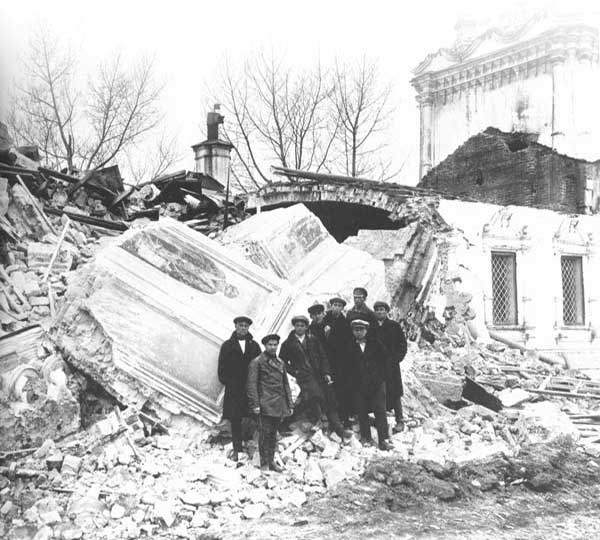 |
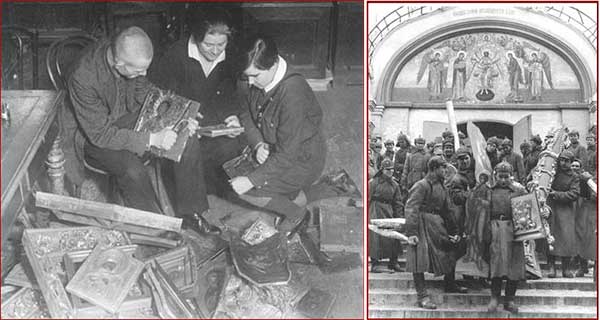 |
| During and after the Bolshevik revolution there were many attacks on religion. Churches and mosques were pulled down. Works of art in churches were plundered, as can be seen in the above pictures. |
The enmity Communism and materialism had for religion showed itself in all its violence during the Bolshevik uprising. Churches and mosques were razed, and among the categories of those pushed outside the "new socialist society," men of religion had an important place. Despite the fact that most of society was religious people, they were obstructed from carrying out their religious duties. In order to take Sundays, when Christians went to church, out of the equation, the concept of a common day of rest was removed. Everyone would work five days, but the day of rest could be any day. This measure was deliberately introduced by the communists "to facilitate the struggle to eliminate religion".99 Following that, in 1928 and 1930 the taxes paid by men of religion were raised by 10 times, their food coupons were taken from them, and they could no longer use the health services, which meant they no longer enjoyed any civil rights, they were often arrested, moved from their posts and sent into exile. By 1936 some 65 percent of mosques and 70 percent of churches had been destroyed.
Some of the most violent measures against religion were taken in Albania. The Communist leader of Albania, known for having no religion, was Enver Hodja, who in 1967 proclaimed Albania the first "religionless" country. Men of religion would be taken into custody for no reason, and some of them were killed while in custody. In 1948 two bishops and 5,000 men of religion were shot. Muslims were killed in the same way. The literary monthly Nendori announced that 2,169 mosques and churches had been closed down, of which 327 were Catholic places of worship.
The reason for all these practices was, without the shadow of a doubt, Communism's aim of forming societies which would blindly deny the existence of God, had nothing to do with religion, and which only believed in and valued material things. Actually, that was one of Communism's main targets, because the Communist leaders knew that they could only govern as they wished people who had become like machines, and insensitive, unfeeling, and most important of all, non-god-fearing societies, and that they could make them carry out as many killings and as much oppression as they wanted. The claims of Darwinism, which gave support to atheism and which justified all kinds of oppression, cruelty, conflict, and killing, forbidden in religion, encouraged in this way all the ideologies which spilt blood and counted human life as valueless in the 20th century. That is why the last century was full of ceaseless wars, massacres, rebellions, acts of violence, fighting, and enmity.
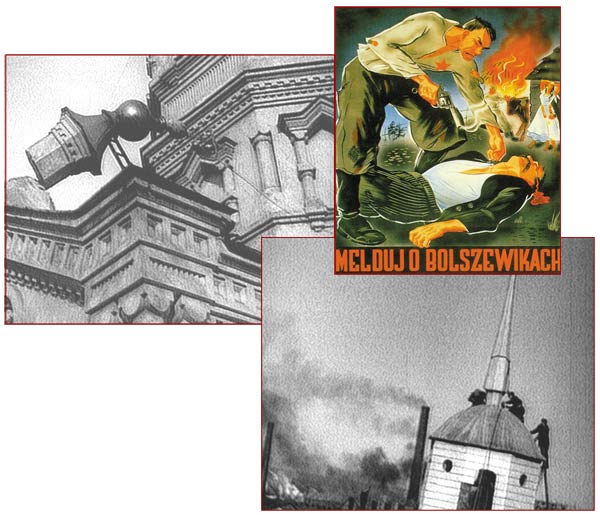 |
Who could do greater wrong than someone who bars access to the mosques of Allah, preventing His name from being remembered in them, and goes about destroying them? Such people will never be able to enter them – except in fear. They will have disgrace in this world and in the hereafter they will have a terrible punishment. (Surat al-Baqara: 114)
The Oppression and Violence Inflicted On the World by Darwinist Communists
Anarchy and terror are two of Marxism and Communism's indispensable tools. Marxism's tendency towards terrorism and violence appeared in the experiment of the Paris Commune while Marx was still alive. In particular, terrorism became an indispensable part of Communist ideology with Lenin, while he was making Marx's theory a practicality. Communists spilt the blood of millions of people in every part of the world, and made people undergo pain, fear, and violence by establishing terrorist organisations. As will be seen in the pages that follow, today all the Communist leaders are remembered for the oppression and killings they carried out. Yet despite this some circles still cover their walls with pictures of these pitiless, bloody-handed assassins, and still accept these sadistic people as their teachers.
No matter how much some Communists claim that violence and terrorism are not Communist practices and that they only took place in some individuals' applications of Communism, and no matter how much they try to whitewash Communism, there is an undeniable truth: The founders of Communism personally defended violence and terrorism and saw them as essential to their ideology. The American political scientist Samuel Francis has this to say on the subject:
Marx and Engels were generally specific in insisting that revolution will always be violent and that revolutionaries must use violence against the rulers, and in some instances they did express support of terrorism.100
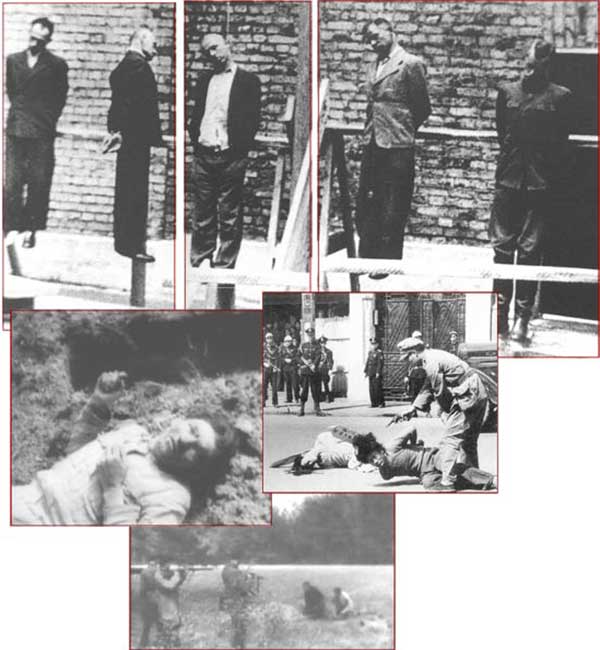 |
| The Communist revolution was very bloody. Tens of millions of people were massacred and ruthlessly killed. The Communist leaders ordered that everyone who opposed them should be killed. |
Karl Marx said "insurrection is an art quite as much as war" and took these words of Danton, one of the foremost names in "revolutionary politics" as a principle, "de l'audace, de l'audace, encore de l'audace" (Attack, attack, and attack again!)101
There are clear statements by Lenin regarding the necessity of systematically using terrorism. Here are a few of them:
In reality the state is nothing but a machine for the suppression of one class by another. Dictatorship is rule based directly on force and unrestricted by laws... The revolutionary dictatorship of the proletariat is rule won and maintained through the use of violence by the proleteriat against the bourgeoisie, rule that is unrestricted by any laws.102
We are not at all opposed to political killing… Only in direct, immediate connection with the mass movement can and must individual terrorist acts be of value.103
To become a power the class-conscious workers must win the majority to their side. As long as no violence is used against the people there is no other road to power.104
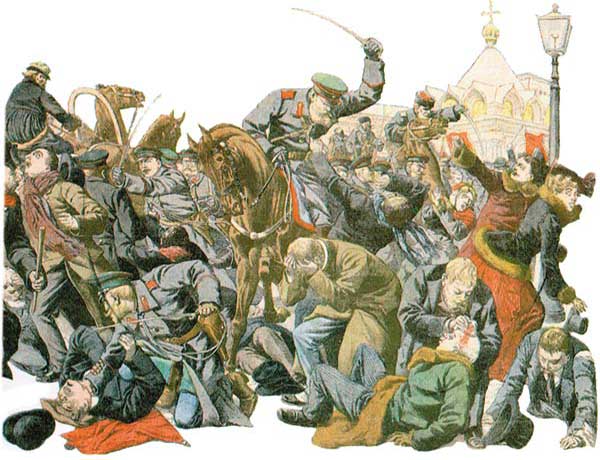 |
RUSSIAN OPPRESSIONThe oppression experienced in the Russian revolution was reflected in pictures. |
Speaking at a workers' meeting, Lenin gave a terrifying statement of how indispensable terrorism was to them:
If the masses do not rise up spontaneously, none of this will lead to anything… For as long as we fail to treat speculators the way they deserve – with a bullet in the head – we will not get anywhere at all.105
One of the most important leaders of the October Revolution in Russia, Trotsky, says this to confirm Lenin's words:
But the revolution does require of the revolutionary class that it should attain its end by all methods at its disposal—if necessary, by an armed rising: if required, by terrorism.106
Trotsky went even further in another speech,
Our only choice now is civil war. Civil war is the struggle for bread… Long live civil war!107
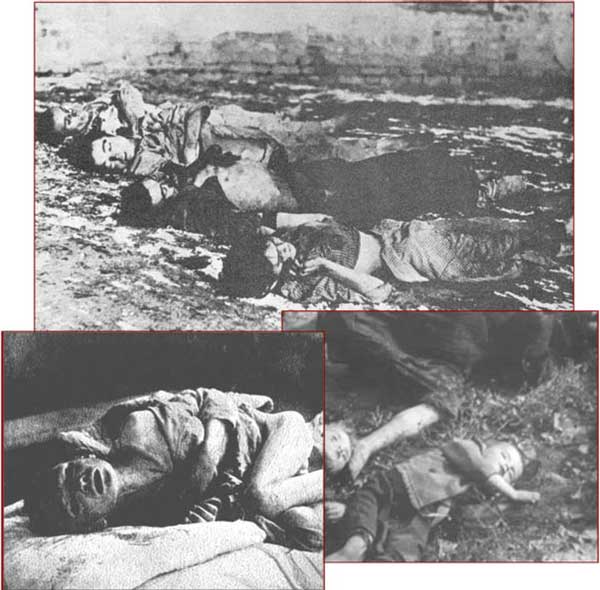 |
| The results of the 1921-1922 famine, brought about by the Communist regime, were most painful. The pictures show people who died of starvation. |
These principles of such Communist theoreticians as Lenin and Trotsky were put into practice in the Bolshevik revolution in Russia. During the revolutionary period of autumn 1917 there began wide-ranging massacres, looting, and terrible violence. Those people who were against the revolution, or who were suspected of being against the revolution, were rounded up for no reason, arrested, and shot: houses were looted and wrecked. Terrorism, which began with Lenin and Trotsky continued and grew worse in the Stalin years.
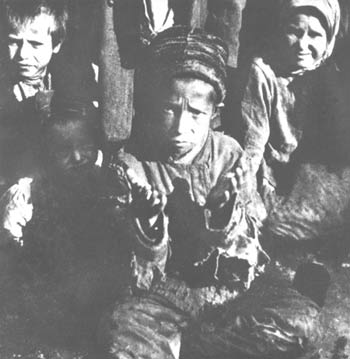 |
| The Russian government's taking villagers' produce in the Ukraine led to people dying of starvation. |
Harrison E. Salisbury of The New York Times described the Soviet system's prison camps as:
…a whole continent of terror… Compared with those who brought about the hundreds of thousands of executions and the millions of deaths in the Soviet terror system, the Czars seem almost benign… Our minds boggle at the thought of a systematized, routine evil, under which three or four or more million men and women were sentenced each year to forced labour and eternal exile–and in a manner so casual that the prisoners often were not even told what their sentences were...108
Non-Russian peoples, and particularly the Crimean Turks, the Central Asian Turks, and the Kazakhs, were exposed to the terrorism of the Soviet system. Special courts, troiki, were established to cleanse Russian society of the Kazakhs. In October 1920 alone these troiki sentenced more than 6,000 people to death, and these orders were immediately carried out. The families, and sometimes even the neighbours, of those who opposed the regime and were not apprehended, were systematically taken hostage and sent to concentration camps. Martin Latsis, the head of one of these camps in the Ukraine admitted that these were death camps in one of his reports:
Gathered together in a camp near Maikop, the hostages, women, children, and old men survive in the most appalling conditions, in the cold and mud of October… They are dying like flies. The women will do anything to escape death. The soldiers guarding the camp take advantage of this and treat them as prostitutes.109
Under the influence of Darwin, the Communist revolutionaries were killing people in a crazed manner. It appears from documents of the time that the sole aim was total extermination. It was as if they believed that the more people they killed, the greater success they would have. That they planned to wipe out everybody they suspected of being against the revolution is revealed in one of their decisions:
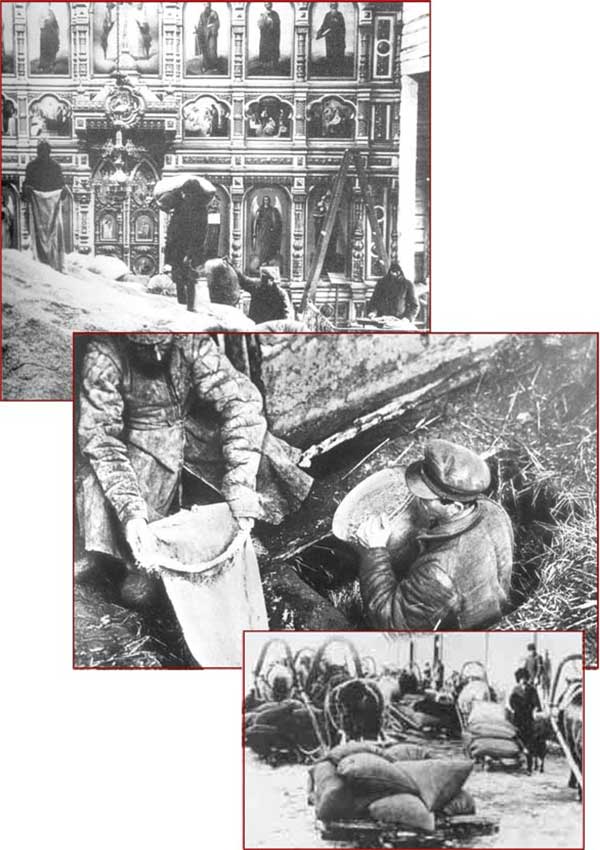 |
| "Requisitioning Detachments" were set up by Stalin, and as well as torturing, they seized villagers' produce. These units oppressed the people in various ways. Those who could not find enough produce to give to the state officials were tortured to death in a number of ways. |
The Pyatigorsk Cheka (Extraordinary Committee for War Against the Counter-Revolution) decided straight out to execute 300 people a day. They divided up the town into various boroughs and took a quota of people from each, and ordered the Party to draw up execution lists…In Kislovodsk, for lack of a better idea, it was decided to kill people who were in the hospital.110
As was announced in the lead article of the newspaper Krasnyi Mech (The Red Sword), which was Communist supporting, the Communists saw everything as permissible and believed that blood had to be spilt for the colour of the Red flag to come about.
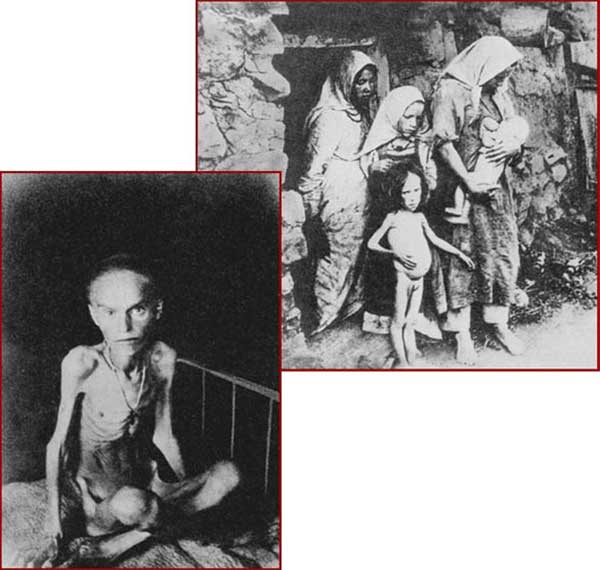 |
| The dreadful state of people under Communist rule. |
To us, everything is permitted, for we are the first to raise the sword not to oppress races and reduce them to slavery, but to liberate humanity from its shackles… Blood? Let blood flow like water! Let blood stain forever the black pirate's flag flown by the bourgeoisie, and let our flag be blood-red forever! For only through the death of the old world can we liberate ourselves forever from the return of those jackals!111
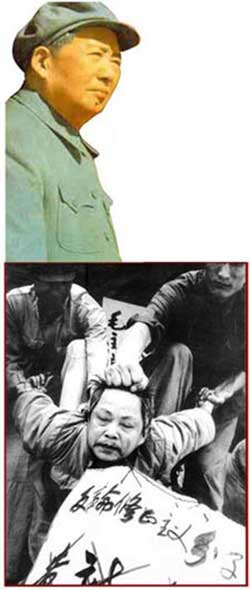 |
| The execution of a Chinese woman, Wang Souxin. The money for the bullets used in executions in Red China was extracted from the relatives of the victims. |
As well as all this torture, Stalin set up "requisitioning detachments" to take the peasants" produce by force. These units were responsible for all kinds of oppression. On 14 February 1922 one inspector wrote:
Abuses of position by the requisitioning detachments, frankly speaking, have now reached unbelievable levels. Systematically, the peasants who are arrested are all locked up in big unheated barns; they are then whipped and threatened with execution. Those who have not filled the whole of their quota are bound and forced to run naked all along the main street of the village and then locked up in another unheated hangar. A great number of women have been beaten until they are unconscious and then thrown naked into holes dug in the snow…112
Stalin believed that Spain represented opportunities for the USSR and that meddling in that country would bear fruit. For that reason he took sides and supported the Communists in the Spanish Civil War. But with that the terrorism in the USSR overflowed into Spain. One example of the oppression and torture there was the concentration camp that 200 anti-Stalinists were held in at the beginning of 1938. "When the Stalinists decided to open a cheka," one victim recalled;
There was a small cemetery being cleaned out nearby. The Chekists had a diabolical idea: they would leave the cemetery's tombs open, with the skeletons and the decomposing bodies in full view. That's where they locked up the most difficult cases. They had some particularly brutal methods of torture. Many prisoners were hung up by their feet, upside down, for whole days. Others they locked in tiny cupboards with just a tiny air hole near the face to breathe through… One of the worst methods was known as "the drawer"; prisoners were forced to squat in tiny square boxes for several days. Some were kept there unable to move for eight to ten days.113
In 1931 Pope Pius XI had this to say about the violence Communism had inflicted on the world in the encyclical Quadragesimo Anno:
Communism teaches and seeks two objectives: unrelenting class warfare and the complete eradication of private ownership. Not secretly or by hidden methods does it do this, but publicly, openly, and by employing any means possible, even the most violent. To achieve these objectives there is nothing it is afraid to do, nothing for which it has respect or reverence. When comes to power, it is ferocious in its cruelty and inhumanity. The horrible slaughter and destruction through which it has laid waste vast regions of Eastern Europe and Asia give evidence of this.114
As the above extract says, Communism's principle aims were a merciless class war and the complete doing away with private property. In other words the aim was to apply the theory of evolution, which Darwin had applied in the biological field, to human societies, and for human beings to be, like wild animals in nature, in conflict, at war.
The disasters brought about by Communism did not stop in Russia. One of the countries worst affected among those to which it spread was China.
The Darwinist Mao Tse-Tung and His Massacres
China's Communist leader Mao had two important guides: one of these, as we touched on earlier, was Darwin, and the other was Stalin. These two lethal names, which met together in Mao's personality, led to great tragedies and left their mark on a long, dark period in Chinese history. Between 6 to 10 million people were directly killed under Mao Tse-Tung's directives, tens of millions of counter-revolutionaries spent great parts of their lives in prison, where 20 million of them died. Between 20 and 40 million people died of starvation in the years 1959-1961, in the period called "The Great Leap Forward," as the dreadful result of Mao's extremist policies. The June 1989 Tienanmen Square massacre (about 1,000 dead) is one example of what China has gone through in its recent history. The killings and genocide directed against the Muslim Turks in Eastern Turkestan are still going on.
Great savagery and inhuman things took place when the Communist revolution happened in China. The people, who were under the effects of a kind of mass hypnotism, supported all kinds of savagery and showed that support by shouting as they watched the killings. The book Le Livre Noir du Communisme ("The Black Book of Communism"), prepared by a group of historians and teachers, described Communism's savage practices in this way:
The whole people were invited to public trials of "counterrevolutionaries," who almost invariably were condemned to death. Everyone participated in the executions, shouting out "kill, kill" to the Red Guards whose task it was to cut victims into pieces. Sometimes the pieces were cooked and eaten, or force-fed to members of the victim's family who were still alive and looking on. Everyone was then invited to a banquet, where the liver and heart of the former landowner were shared out, and to meetings where the speaker would address rows of severed heads freshly skewered on stakes. This fascination for vengeful cannibalism, which later became common under the Pol Pot regime, echoes a very ancient East Asian archetype that appears often at cataclysmic moments of Chinese history.115
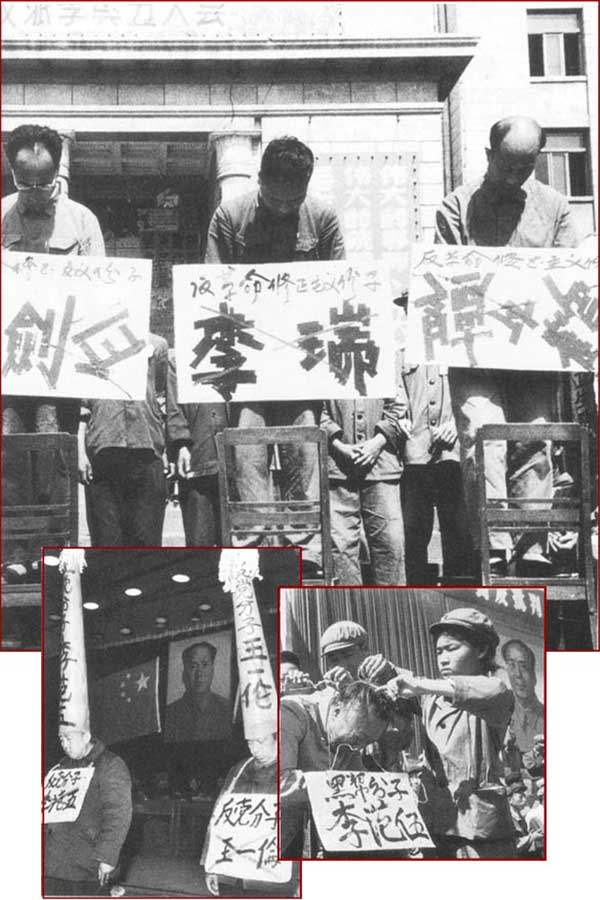 |
| Chinese party leaders accused of being capitalists first had their heads shaved in front of the people and were then executed. |
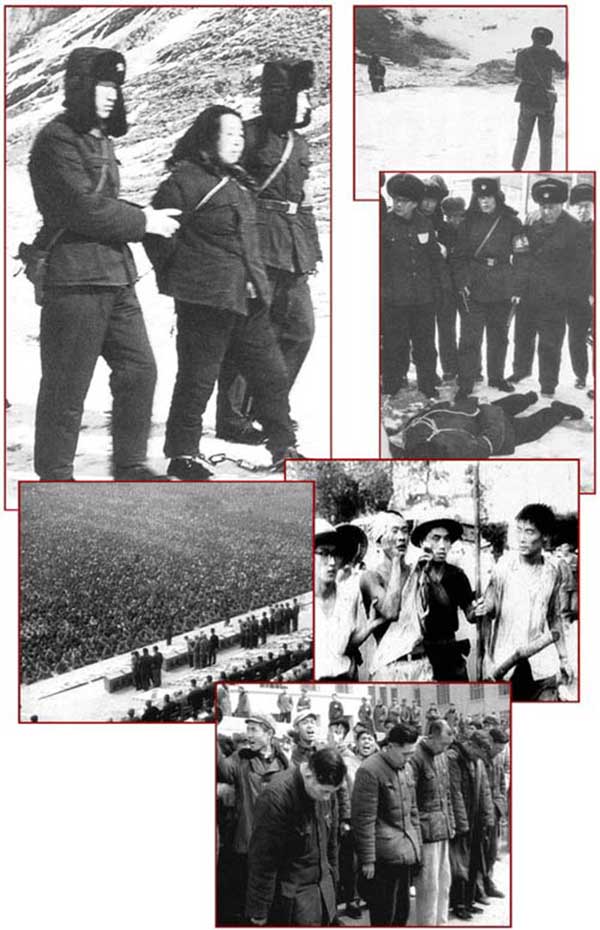 |
| The execution of a Chinese woman, Wang Souxin. The money for the bullets used in executions in Red China was extracted from the relatives of the victims. |
Pol Pot and The Khmer Rouge "Killing Fields" | |
| Between 1975 and 1979, during the rule of Pol Pot, two million of Cambodia's population of seven million were killed. When one looks at the killings by Pol Pot, who dreamed of establishing a perfect Communist state, as a percentage of the population, then his killings were much greater than those by Hitler and Stalin. Pol Pot's fundamental target were the sections of society such as doctors, engineers, scientists, in short the country's intellectuals, whom he had killed. The order was even given that "everyone wearing glasses" should be killed. As a result of these inhuman murders, the "killing fields," which lasted for years, emerged.
The logic employed by the Khmer Rouge officers to justify their massacres was summed up in these words: "Keeping you is no gain. Losing you is no loss" They killed everyone whom they considered to be, or even suspected of being, useless or harmful. At least one member of every family lost his life in these massacres. Pol Pot, who counted human life as nothing, believed that the family stood in the way of his radical vision of socialism. He tried to do away with the idea of the family by splitting families up and obliging human beings to live in communal places. The same policy had been implemented by Stalin in Russia. First the peasants' lands were taken from them, then small parcels of land given back, in areas deliberately scattered and far removed from one another. The result of this was that in order for a family to work their fields which consisted of tiny parcels of land they would have to live separate from one another. Robert Templer, Pol Pot's Legacy of Horror, The Age, April 18, 1998, http://dithpran.org/PolPotegacy.htm |
 |
| Pol Pot and the Khmer Rouge turned the country into "Killing Fields." |
The Bitter Toll of Communist Savagery
Similar examples of savagery were experienced in every country Communism took over, Cambodia, North Korea, Laos, Vietnam and Eastern European and African countries. This bloody toll is set out in The Black Book of Communism as follows:
These crimes tend to fit a recognizable pattern even if the practices vary to some extent by regime. The pattern includes execution by various means, such as firing squads, hanging, drowning, battering, and, in certain cases, gassing, poisoning, or "car accidents"; destruction of the population by starvation, through man-made famine, the withholding of food, or both; deportation, through which death can occur in transit (either through physical exhaustion or through confinement in an enclosed space), at one's place of residence, or through forced labour (exhaustion, illness, hunger, cold). Periods described as times of "civil war" are more complex – it is not always easy to distinguish between events caused by fighting between rulers and rebels and events that can properly be described only as a massacre of the civilian population.
Noneless, we have to start somewhere. The following rough approximation, based on unofficial estimates, gives some sense of the scale and gravity of these crimes:
U.S.S.R.: 20 million deaths
China: 65 million deaths
Vietnam: 1 million deaths
North Korea: 2 million deaths
Cambodia: 2 million deaths
Eastern Europe: 1 million deaths
Latin America: 150,000 deaths
Africa: 1.7 million deaths
Afghanistan: 1.5 million deaths
The international Communist movement and Communist parties not in power: about 10,000 deaths
The total approaches 100 million people killed.116
These inhuman movements thought that they had won respectability by wearing a false scientific mask. The only reason the Bolshevik leaders were able to talk so boldly and openly of aggression, terrorism, and massacre was the approval they got from Darwin's theory of evolution. In his book Evolution for Naturalists, P. J. Darlington admits, as an evolutionist, that savagery is a natural result of the theory of evolution and that this behaviour is even justified:
The first point is that selfishness and violent are inherent in us, inherited from our remotest animal ancestors... Violence is, then, natural to man, a product of evolution.117
As is clear from this evolutionist's admission, it was perfectly natural for Communist ideology, which accepted Darwin's theory of evolution as its guide, to perceive other human beings as animals, treat them in a manner befitting animals, and oppress them. Because he who accepts Communist-Darwinist ideology forgets that he has a Creator, the reason for his being in the world, and that he will have to give an account of what he has done to Him on the Day of Judgement. And as a result of this, like every human being who has no fear of Allah, he comes to be a selfish thing who thinks only of his own interests, a pitiless tyrant, even a wild-eyed killer. Allah reveals these peoples' situation and what will happen to them in this way:
There are only grounds against those who wrong people and act as tyrants in the earth without any right to do so. Such people will have a painful punishment. (Surat ash-Shura: 42)
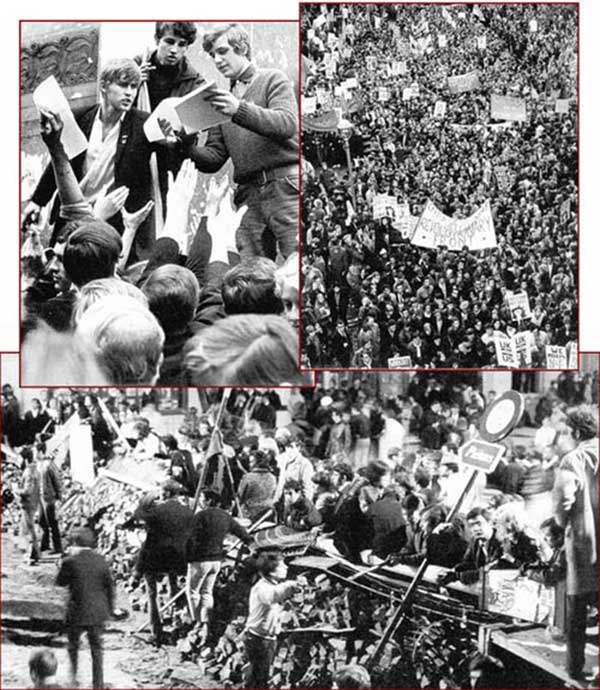 |
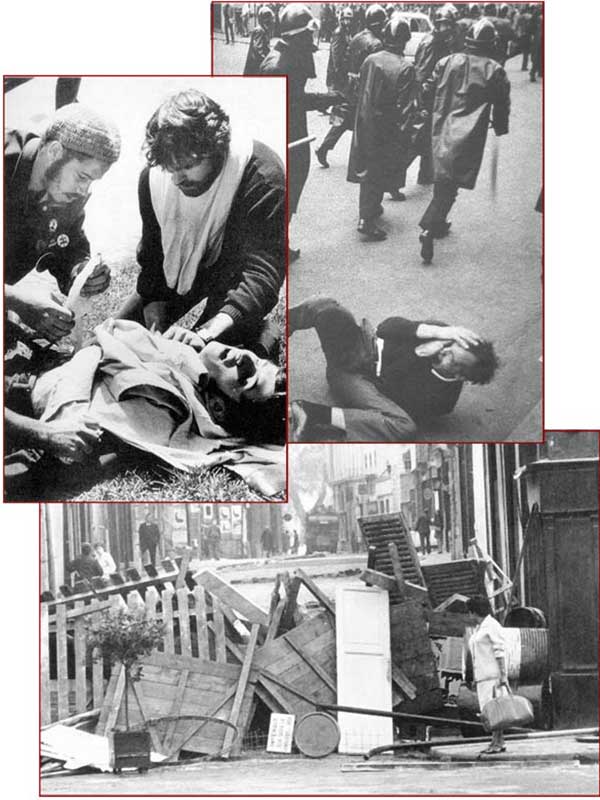 |
| In 1968 left-wing ideology affected all parts of the world, particularly young people in universities. Meetings were held, and young people were incited against their own compatriots, the police, and the military. By virtue of these events, where brother attacked brother, cities were devastated, and the whole world fell into chaos. |
The Oppression in Eastern Turkestan |
| No matter how much it is accepted that the dissolution of the Soviet Union spelt the end of Communism as a political regime, Communist ideology and practice still continue. The practices of Russia, where the Red Army mentality still dominates, in Chechnya, and of China in Eastern Turkestan, are the most important indications of this. The Muslim Turks who live today in Eastern Turkestan, are going through a repetition of the experiences of Mao's Red China. Young people are arrested for no reason, sentenced to death on the grounds they are opponents of the regime, and shot, Muslims are prevented from carrying out their group religious duties, their earnings are taken from them by means of ruthless taxes, the people live on the edge of death through the threat of starvation, and the nuclear tests carried out right next to them cause them to catch fatal diseases.p> The Muslim Turks of Eastern Turkestan have been living under Chinese hegemony for 250 years. The Chinese gave the name "Sinkiang" or "conquered lands" to Eastern Turkestan, a Muslim land, and defined it as their own territory. After the Communists led by Mao took it over in 1949, the pressure on Eastern Turkestan increased to even higher levels than before. The policy of the Communist regime aimed at the physical destruction of the Muslims, who rejected assimilation. The number of Muslims killed reached terrifying proportions. Between 1949 and 1952, 2,800,000; between 1952 and 1957, 3,509,000; between 1958 and 1960, 6,700,000; between 1961 and 1965, 13,300,000 people were either killed by the Chinese Army or died as a result of the shortages brought about by the regime. Together with the massacres after 1965, the number of Eastern Turkestan people killed reached the high figure of 35 million. As well as wiping out the Muslims since 1949, the regime also systematically moved Chinese settlers in. The effects of this campaign, which the Chinese government began in 1953, are most thought-provoking. While in 1953, 75% of the population was Muslim and 6% Chinese, by 1982 the figures were 43% Muslim and 40% Chinese. The 1990 census, which revealed that the population figures were now 40% Muslim and 53% Chinese, is most important from the point of view of revealing the scale of the ethnic cleansing. Meanwhile, the Chinese administration used the Eastern Turkestan Muslims as experimental animals in their nuclear tests. As a result of the nuclear tests, which first started in the region in 1964, local people have been infected by deadly diseases, and 20,000 handicapped children have been born. It is known that the number of Muslims who have died because of the tests is 210,000. Thousands of people have been crippled, and thousands have fallen prey to such diseases as jaundice and cancer. Between 1964 and the present, China has exploded some 50 atomic and hydrogen bombs. Swedish experts established that an underground nuclear test in 1984 of a bomb with a force of 150 tons had resulted in earth tremors of a magnitude of 8.8 on the Richter scale. China's oppression of the Uighur Turks does not stop there. The experiences of February, 1997, during a time when incidents were increasingly flaring up, will serve to sum up the Chinese oppression. According to news reported to the public, on Sept. 4, which happened to be a feast day, Chinese militia forces beat more than 30 women, who had gathered in a mosque and were reading out from the Qur'an, with iron bars and dragged them to security headquarters. The local residents went to the headquarters and asked for the women to be released. At that point the bodies of three women who had been tortured to death were thrown in front of them. Then clashes began between the people, who rose to the provocation, and the Chinese. Between Sept. 4 and 7, 200 Eastern Turkestan people lost their lives and more than 3,500 Uighur Turks were locked up in camps. On the morning of Sept. 8, people were prevented by the security forces from offering holiday prayers in the mosques where they had gathered. Following this the clashes flared up again, and as a result the number of detained, which had been 58,000 between April and December 1996, went past 70,000. As many as 100 young people were shot in public squares, and 5,000 Uighur Turks were stripped naked and publicly exhibited in groups of 50. The example of Eastern Turkestan is just one of the sufferings in the 20th century. In every corner of the world in the 20th century people of different religions, races, or ideologies killed and exterminated each other. It is no coincidence that behind all the ideologies which did these killings Darwin's world view should emerge. Because with his theory Darwin made it easy for people to kill each other without having any pangs of conscience and thus provided a supposed legitimacy for the commission of murder. |
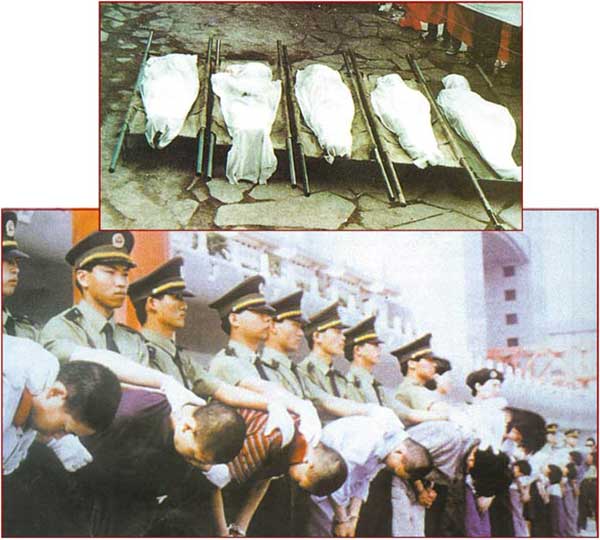 |
| When those who did wrong see the punishment, it will not be lightened for them. They will be granted no reprieve. (Surat an-Naml: 85) However, those who do wrong pursue their whims and desires without any knowledge. Who can guide those whom Allah has led astray? They will have no helpers. (Surat ar-Rum: 29) |
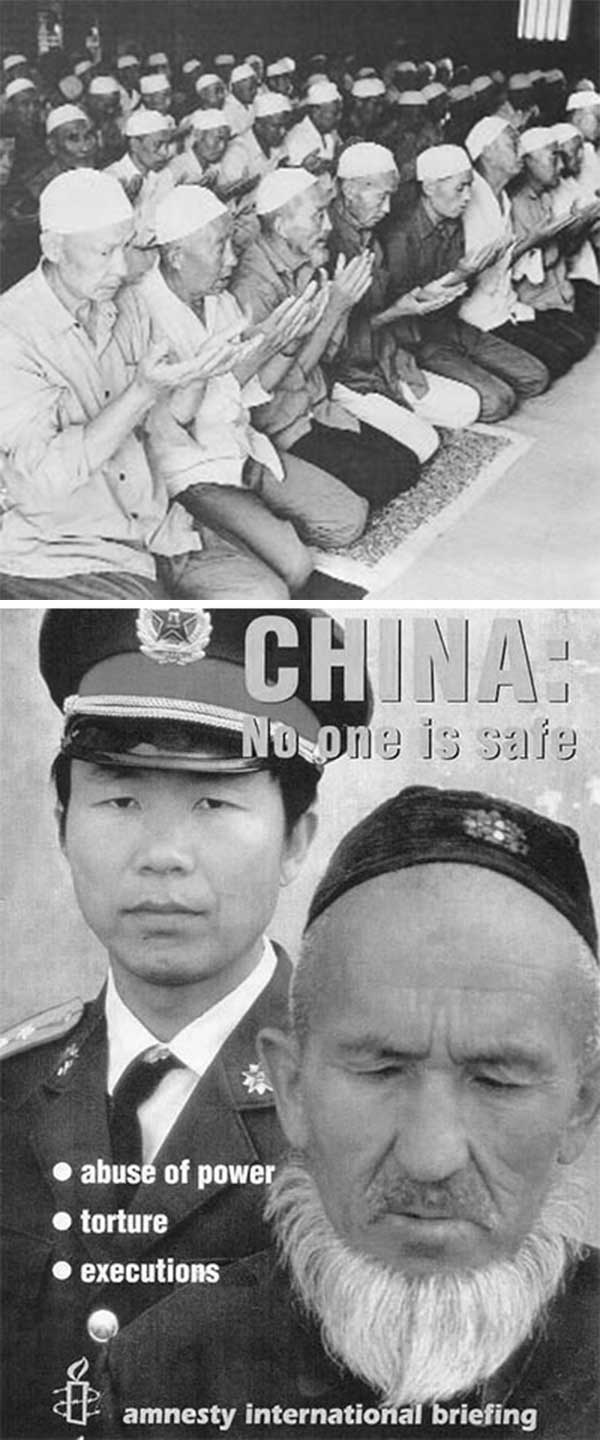 |
| Those to whom people said, "The people have gathered against you, so fear them." But that merely increased their faith and they said, "Allah is enough for us. He is the Best of Guardians." (Surah Al 'Imran: 173) |
The Never-Ending Oppression in Chechnya |
| The Russian occupation of Chechnya in 1991, despite being thrown back by the late Dzhokar Dudayev, turned into a genuine war on Dec. 11, 1994, following serious trouble in November that same year. While more than 100,000 Chechens lost their lives in that war, tens of thousands were forced to migrate. Chechnya lost hundreds of historical and economic resources in the war. When Russia announced that Chechnya was an "internal matter," no protest came from the outside world. Tons of bombs fell on every square metre in Chechnya. A genocide was carried out, the like of which has never been seen in the history of the world, with chemical weapons, the use of which was forbidden ant it still continues today. But despite all the difficulties, in August 1996 the Russians had to admit defeat at the hands of the Chechens, who were completely undaunted and fought for their own land with all the means at their disposal. |
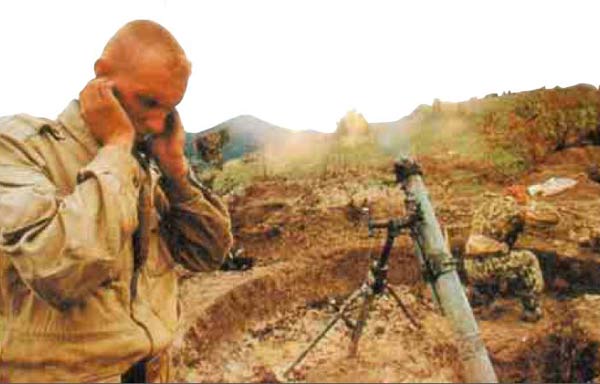 |
| Russia, which had to accept Chechnya as a separate state in agreements signed at the highest levels in August 1996 and May 1997, seemed to have accepted this situation. Whereas in October 1997 the Russians entered Chechen territory and began to kill, not sparing women, children, and the elderly. Civilian targets came under non-stop bombardment for months. In order to break the popular resistance, hospitals, maternity wards, markets, and refugee convoys were especially chosen as targets. At the last it was established that the Russians used chemical bombs and scud and napalm missiles against the Chechens. Alongside this, the Russians put poison into the River Argun, used by many Chechen villages. While the great majority of the women and children who drank the poisoned water died, hundreds waited for death at the doors of the hospitals. Because the river water had been poisoned the civilian population who were unable to find water for drinking and other purposes went through very difficult times. The situation of the refugees was also worrying. Studies carried out in refugee areas showed that human rights infringements reached enormous proportions. Some 250,000 Chechen refugees who fled from the war are under protection in Ingushetya, the rest in neighbouring regions. It has been announced that Russia spent 385 million dollars on the operation. The Chechens revealed that between September 1999 and July 25, 2000, 1,460 Chechen soldiers and 45,000 civilians had died. Russia's plan was to wipe out all the Chechen soldiers who had been fighting them by November 2000. |
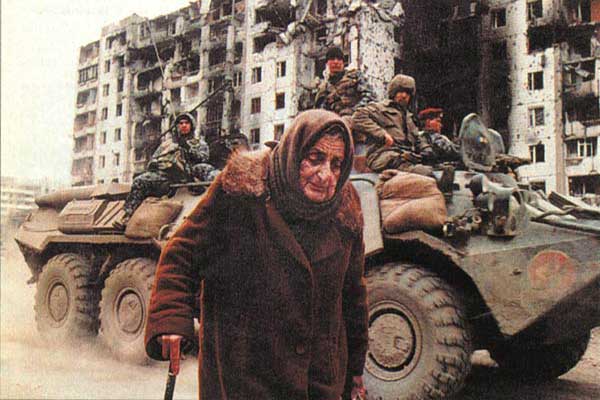 |
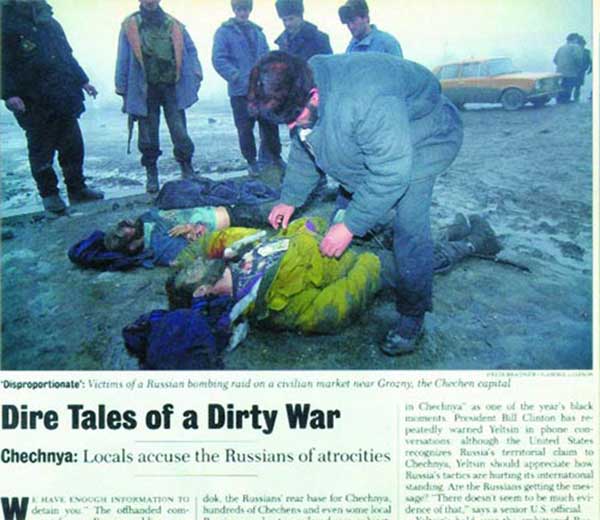 |
| Newsweek 13 Februar 1995 |
 |
| Newsweek 1 November 1999 |
 |
| Newsweek 6 December 1999 |
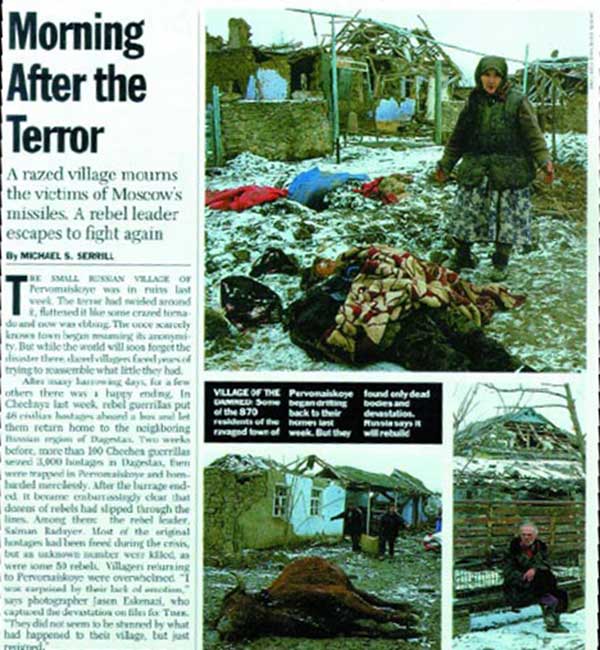 |
| Time 5 Februar 1996 |
The Spell of Communist Darwinist Ideology is Dispersed |
| Communism is an ideology which was brought into being by people who lived in the 1800s, and who can be described as "ignorant" from the scientific point of view. One of the most important reasons for the rapid winning of influence over wide sections of the peoples of many country's by this ideology, whose analysis and claims have been proven false many times and which furthermore has clearly brought harm to mankind and not good, is the ignorance of those human beings who accepted this ideology. After the Industrial Revolution, one part of society's being in terrible poverty, and alongside this, another part's rising to an incomparable level of well being, brought out a tension open to agitation in social groups in most countries. This tension developed in countries such as Russia, still living on the level of an agricultural society, and China. Social groups looking for right and justice followed along behind. But the end result worked against them. They lived under far worse economic conditions than before, on the one hand struggling to avoid dying of hunger, on the other living with the fear and terror of being killed at any moment, torture, exile, and robbery. It was evident that that an ideology based on lack of religion, which believed that the sole basis for development was conflict, fighting, and war, that human beings are basically animals, based on the deviation that moral values such as family, faithfulness, and closeness are unnecessary and irrelevant, would not bring people peace, security, happiness, and justice. But these social groups lacked the vision and understanding to evaluate and analyse these. They looked at photographs of Marx and Engels and thought them to be most "deep," "incomprehensible," and "knowledgeable" thinkers. They looked at the illusory scientific and deep exterior and the syrupy manners of those who supported them and fell under the spell of Communism and materialism. Whereas today, had they been alive, they would have understood that every Communist leader had a very coarse and primitive understanding and were ignorant people. None of the people they accepted as leaders behaved in a forward-looking manner, they were only able to bind social groups to them by insults and fear: they were people who adopted violence, savagery, ruthlessness, and murder as methods, and thought in a coarse and primitive way. Today many an "old time" Communist has realised what a great mistake he made in the past and regretted it. Each one has understood that he had blindly followed an unproductive ideal, or rather an empty, loud noise. Others try to show that they have still not given their ideology up in order not to accept the defeat and the truth that the years were wasted and say, "We shall overcome." A period has begun when science and free knowledge can reach anywhere at any time, when any human being can realise truths and realities much easier than before, and to a greater degree. In such an environment the methods of suggestion, reminiscent of a magic spell, of the Communists, materialists, and Darwinists, their talismanic words and calls to war have now lost their power. Hollow ideologies such as Communism, materialism, and Darwinism, whose spellbinding power can be lifted with a little science and a little thought, are rapidly losing their influence on human beings. As a result of this, lighter, more peaceful and comfortable days await mankind. Most important, the realisation of the deception of Darwinism, with full proof, will bring about the end of these ideologies. |
Conclusion: Communism is a Terror Brought about by Lack of Religion
Anyone who considers the massacres, murders, and the suffering deliberately inflicted on human beings by the Communists, Nazis, or colonialists, will wonder how the supporters of these ideas could have distanced themselves so far from common humanity. The sole reason for the savagery and oppression inflicted by these leaders is lack of religion and the fact these people had no fear of God. A human being who fears God and who has firm faith in the hereafter, will definitely be incapable of carrying out any of the oppression, wrongs, injustice, and murders that we have described. Furthermore, no matter how much he may be encouraged, someone who believes in God and the hereafter will never be pulled into following such a deviant ideology.
But people who have no religion and no fear of God know no limits. With a bit of encouragement a person who believes that he and other living creatures evolved by coincidence out of non-living matter, who believes that his ancestors were animals, and who accepts that nothing exists apart from the material, can easily carry out any kind of cruelty. At first sight perhaps these people might seem as if they do not hurt anybody: but given the right circumstances they can turn into a killer who carries out massacres, assassins who beat people or starve them just because they do not accept their ideas, people filled with hatred, loathing, and violence. Because the world view and values they believe in necessitate this.
In 1983, Alexander I. Solzhenitsyn, winner of the 1970 Nobel-prize for literature, gave an address in London in which he attempted to explain why so much evil had befallen his people:
Over a half century ago, while I was still a child, I recall hearing a number of old people offer the following explanation for the great disasters that had befallen Russia: "Men have forgotten God; that's why all this has happened."
Since then I have spend well-nigh 50 years working on the history of our revolution; in the process I have read hundreds of books, collected hundreds of personal testimonies, and have already contributed eight volumes of my own toward the effort of clearing away the rubble left by that upheaval. But if I were asked today to formulate as concisely as possible the main cause of the ruinous revolution that swallowed up some 60 million of our people, I could not put it more accurately than to repeat: "Men have forgotten God; that's why all this has happened."118
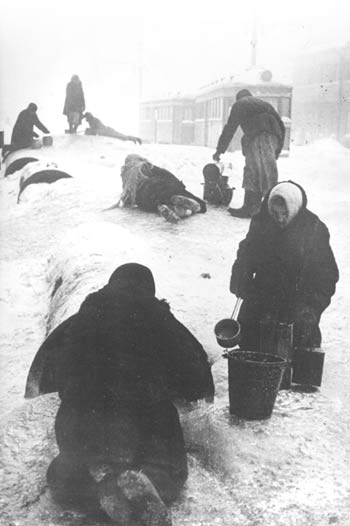 |
WRONGED PEOPLEThese pictures sum up a part of the nightmare which Communist ideology inflicted on mankind. People weakened by hunger, thirst, and hopelessness, living in poverty and need… |
This identification of Solzhenitsyn's was utterly accurate. Really, the only thing that could drag a society into that much terror, to turn a blind eye to all kinds of oppression, to watch from the sidelines, is the forgetting of God. Whereas God never forgets and is never mistaken. The ruthless Communist leaders thought that they had set up their own system to rule societies on earth and thought that they possessed a great power and strength. They even held secret meetings, where they whispered to each other of the further oppression they would inflict on people to increase their power and strength. But while they were doing all this, God knew of it, and He will answer what they have done. He announces it in the Qur'an:
On the Day Allah raises up all of them together, He will inform them of what they did. Allah has recorded it while they have forgotten it. Allah is a Witness of all things. Do you not see that Allah knows what is in the heavens and on the earth? Three men cannot confer together secretly without Him being the fourth of them, or five without Him being the sixth of them, or fewer than that or more without Him being with them wherever they are. Then He will inform them on the Day of Rising of what they did. Allah has knowledge of all things. (Surat al-Mujadila: 6-7)
Then there are the groups who followed these ruthless leaders, who crawled along behind them. Their situation has been revealed in the Qur'an. It was announced in the verse "Allah does not wrong people in any way;rather it is people who wrong themselves." (Surah Yunus: 44) In other words these people oppressed themselves by forgetting the religion of Allah and following Darwinist leaders. Another holy verse announces that people bring about the evil that happens in the world themselves:
Corruption has appeared in both land and sea because of what people's own hands have brought about so that they may taste something of what they have done so that hopefully they will turn back. (Surat ar-Rum: 41) (Surat ar-Rum: 41)
The only way to prevent these disasters from bringing harm to mankind again is for people to live with faith in Allah and the hereafter and without forgetting that they will have to account for everything they do. And, in the light of the Qur'an, which Allah sent down for all people, for them to possess the good moral features, such as love, compassion, mercy, and devotion, which are commanded in it.
Anyone who acts rightly, male or female, being a believer, We will give them a good life and We will recompense them according to the best of what they did. (Surat an-Nahl: 97)
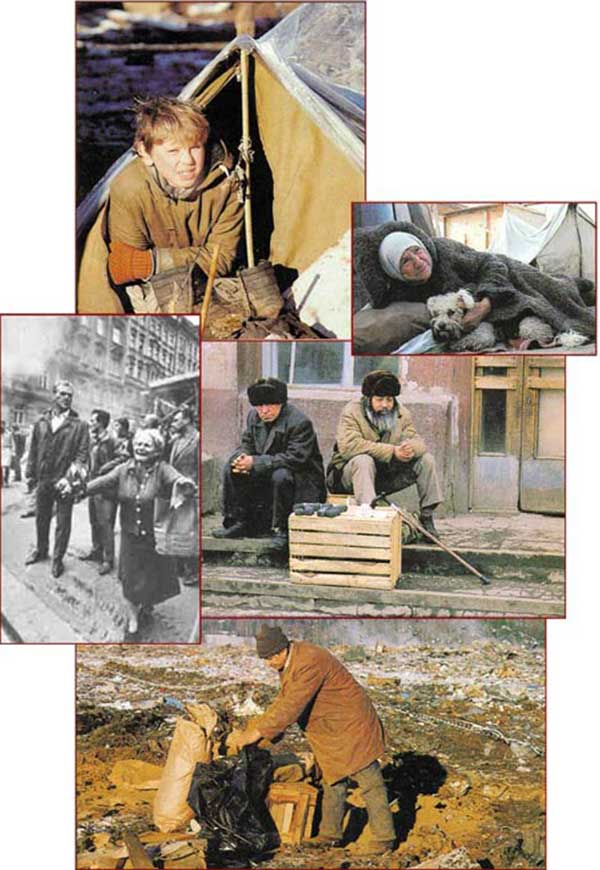 |
| A regime with Darwinist-Communist views holds its people of no value. It abandons them to death and poverty with open eyes. Russia is an obvious example of this. |
Footnotes
78- Conway Zirkle, Evolution, Marxian Biology and the Social Scene, Philadelphia: University of Pennsylvania Press, 1959, pp.85-87
79- Conway Zirkle, Evolution, Marxian Biology and the Social Scene, Philadelphia: University of Pennsylvania Press, 1959, pp.85-87
80- Conway Zirkle, Evolution, Marxian Biology and the Social Scene, Philadelphia: University of Pennsylvania Press, 1959, pp.85-87
81- Stephen Jay Gould, Ever Since Darwin, W. W. Norton & Company, New York 1992, p. 26
82- Friedrich Engels, Socialism: Utopian and Scientific, Foreign Languages Press, Peking 1975, p. 67
83- Gertrude Himmelfarb, Darwin and the Darwinian Revolution, London: Chatto & Windus, 1959, pp. 348-9
84- Friedrich Engels, Socialism: Utopian and Scientific, Foreign Languages Press, Peking 1975, p. 67
85- Conway Zirkle, Evolution, Marxian Biology and the Social Scene, (University of Pennsylvania Press, 1959), pp.85-86
86- Tom Bethell, "Burning Darwin to Save Marx”, Harper's Magazine, (December 1978), p.37
87- Karl Marx Biyografi (The Biography of Karl Marx), Öncü Yayınevi, p. 368
88- John N. Moore, The Impact of Evolution on the Social Sciences, Impact No. 52, www.icr.org/pubs/imp/imp-052.htm
89- Marshall Hall, Hitler, Lenin, Stalin, Mao et al: The Role of Darwinian Evolutionism in Their Lives, http://www.fixedearth.com/hlsm.html
90- Alan Woods and Ted Grant, Reason in Revolt: Marxism and Modern Science, London:1993
91- Kent Hovind, The False Religion of Evolution, http://www.royalse.com/scroll/evolve/ndxng.html
92- E. Yaroslavsky, Landmarks in the Life of Stalin, Moscow: Foreign Languages Publishing House, 1940, pp. 8.; cited by Paul G. Humber, Stalin's Brutal Faith, Vital articles on Science/Creation October 1987, Impact No. 172
93- E. Yaroslavsky, Landmarks in the Life of Stalin, Moscow: Foreign Languages Publishing House, 1940, pp. 8.; cited by Paul G. Humber, Stalin's Brutal Faith, Vital articles on Science/Creation October 1987, Impact No. 172
94- K. Mehnert, Kampf um Mao's Erbe, Deutsche Verlags-Anstalt, 1977
95- Marshall Hall, Hitler, Lenin, Stalin, Mao et al: The Role of Darwinian Evolutionism in Their Lives, http://www.fixedearth.com/hlsm.html
96- Robert Milner, Encyclopaedia of Evolution 1990 p.81
97- Michael Ruse: The Long March of Darwin, New Scientist 103, August 16, 1984: 35; cited in Henry M. Morris, The Long war Against God, Baker Book House, 1989, pp.85-86
98- Henry M. Morris, The Long War Against God, Baker Book House, 1989, p. 57
99- Nicolas Werth, "Le Pouvoir soviétique et l'Eglise orthodoxe de la collectivisation à la Constitution de 1936", Revue d'études comparatives Est-Quest nos. 3-4, 1993, pp.41-49 cited by Stéphane Courtois, Nicolas Werth, Jean-Louis Panné, Andrzej Paczkowski, Karel Bartosek, Jean-Louis Margolin, The Black Book of Communism, Harvard University Press, 1999, p. 172
100- Samuel T. Francis, The Soviet Strategy of Terror, The Heritage Foundation, 1981, p. 46
101- V. I. Lenin; Collected Works, 4th English Edition, Progress Publishers, Moscow, 1964, p. 180
102- V. İ. Lenin, The Proletarian Revolution and The Renegade Kautsky (Moscow: Foreign Languages Publishing House, 1952, pp. 32-33, 20)
103- V. I. Lenin, Collected Works, Moscow, Volume 35, p. 238
104- V. I. Lenin, Collected Works, Vol. 24, pp. 38-41, Progress Publishers, Moscow, 1964
105- V.I. Lenin, Polnoe sobranie sochinenii, (Complete Collected Works), Moscow, Gos.-izd-vo polit. Lit-ry, 1958-1966, 35: 311, cited by Stéphane Courtois, Nicolas Werth, Jean-Louis Panné, Andrzej Paczkowski, Karel Bartosek, Jean-Louis Margolin, The Black Book of Communism, Harvard University Press, 1999, p. 59
106- Ann Arbor, Leon Troçki, Terrorism or Communism, University of Michigan Press, 1961, p. 58
107- Protokoly zasedanii VSIK 4-sozyva, Stenograficheskii otchet (Protocols of the sessions of the CEC in the fourth phase: Stenographic account) (Moscow, 1918), p. 250
108- Harrison E. Salisbury, "Reading The Gulag Archipelago is like no other reading experience of our day," Book-of-the-Month Club NEWS, Midsummer, 1974, pp. 4,5.
109- Russian Center for the Conservation and Study of Historic Documents, Moscow, 17/84/75/59, cited by Stéphane Courtois, Nicolas Werth, Jean-Louis Panné, Andrzej Paczkowski, Karel Bartosek, Jean-Louis Margolin, The Black Book of Communism, Harvard University Press, 1999, p. 100
110- Quoted in V.I. Brovkin, Behind the Front Lines of the Civil War: Political Parties and Social Movements in Russia, 1918-1922, Princeton: Princeton University Press, 1981, p. 353, cited by Stéphane Courtois, Nicolas Werth, Jean-Louis Panné, Andrzej Paczkowski, Karel Bartosek, Jean-Louis Margolin, The Black Book of Communism, Harvard University Press, 1999, p. 101
111- Krasnyi Mech, no.1 (18 August 1919), p.1 cited by Stéphane Courtois, Nicolas Werth, Jean-Louis Panné, Andrzej Paczkowski, Karel Bartosek, Jean-Louis Margolin, The Black Book of Communism, Harvard University Press, 1999, p. 102
112- Stéphane Courtois, Nicolas Werth, Jean-Louis Panné, Andrzej Paczkowski, Karel Bartosek, Jean-Louis Margolin, The Black Book of Communism, Harvard University Press, 1999, p. 119
113- Quoted in Julian Gorkin, Les Communistes contre la révolution espagnole, Paris: Belfond, 1978, p.181, cited by Stéphane Courtois, Nicolas Werth, Jean-Louis Panné, Andrzej Paczkowski, Karel Bartosek, Jean-Louis Margolin, The Black Book of Communism, Harvard University Press, 1999, p. 342
114- Stéphane Courtois, Nicolas Werth, Jean-Louis Panné, Andrzej Paczkowski, Karel Bartosek, Jean-Louis Margolin, The Black Book of Communism, Harvard University Press, 1999, p. 29
115- Stéphane Courtois, Nicolas Werth, Jean-Louis Panné, Andrzej Paczkowski, Karel Bartosek, Jean-Louis Margolin, The Black Book of Communism, Harvard University Press, 1999, p. 470-471
116- Stéphane Courtois, Nicolas Werth, Jean-Louis Panné, Andrzej Paczkowski, Karel Bartosek, Jean-Louis Margolin, The Black Book of Communism, Harvard University Press, 1999, p. 4
117- P.J. Darlington, Evolution for Naturalists, 1980, s. 243-244
118- Edward E. Ericson, Jr., "Solzhenitsyn - Voice from the Gulag", Eternity, October 1985, pp. 23, 24.
- Introduction: the bringers of pain to the 20th century
- Part 1: A Short History of Darwinism
- Part 2: Darwin's Racism and Colonialism
- Part 3: The Terrible Alliance Between Darwin and Fascism
- Part 4: Darwinism, The Source of Communist Savagery
- Part 5: Capitalism and The Fight for Survival in The Economy
- Part 6: The Moral Collapse Brought about by Darwinism
- Conclusion: The Swamp of Darwinism must be Drained

